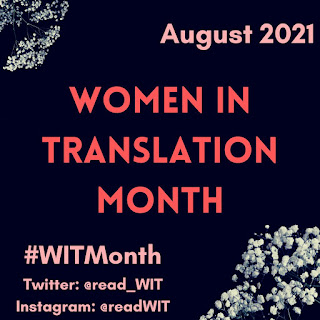When it comes to an event like Women in Translation Month, I usually pick out a few titles in advance that I want to read. But I also like to leave some room for serendipity, like this Israeli novel. I found it while searching through a box of books, had no memory of it… Then I read the blurb, and wanted to read it straight away.
(I’ve since worked out that I got it through an old Asymptote Book Club subscription.)
It’s supposed to be the day of Marie’s and Matti’s wedding, but there’s a problem: Margie has locked herself in her room, and is repeating “Not getting married” over and over again. The novel focuses on the couple’s families and their attempts to get through to Margie.
There’s a wry sense of humour throughout Matalon’s book, and the imagery is often striking. For example, this is from the first couple of pages:
And so they simply continued to stare at the shut door with its old-fashioned dark wood veneer, seemingly anticipating a thawing, a softening, miraculous melting–if not of the bride then at least of the door–and hoping for something further: a continuation of the sentence [i.e. “Not gettiing married”], an idea or a word that might emerge through the door like the wet head of a newborn closely followed by the body itself sliding out.
Translation from Hebrew by Jessica Cohen
I found that comparison to a newborn baby quite startling, and a little uncomfortable, to imagine in context. The novel’s characters are similarly caught off-guard: the only real clue Margie gives them to her state of mind is a section of Lea Goldberg’s poem ‘The Prodigal Son’, adapted to become ‘The Prodigal Daughter’.
And the Bride Closed the Door was Ronit Matalon’s last novel, winning the Brenner Prize the day before the author died in 2017. Reading around a bit, it seems clear that there are reflections on Israeli society in the novel that I wouldn’t have picked up on. Even without that, I found Matalon’s book an intriguing and entertaining character portrait.
Published by New Vessel Press.


Recent Comments